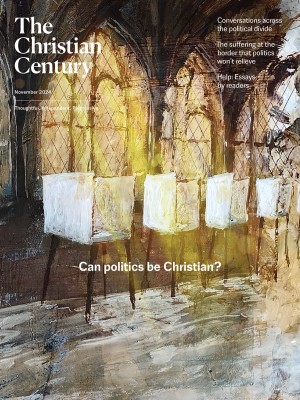November 24, Reign of Christ B (John 18:33–37)
What does it mean to have Christ as a king?
In 1925, Pope Pius XI instituted the feast day of the Solemnity of Our Lord Jesus Christ, King of the Universe. To understand why he did this, we should consider what was happening in the world at the time. That year, Adolf Hitler had just published the first volume of Mein Kampf, which detailed his descent into antisemitism and his sinister designs for world domination. The signing of the Locarno Treaties that year was met with disdain by German extremists, who viewed them as a betrayal of Germany and a weakening of its power and influence in the world. A year later, more than 40,000 members of the Ku Klux Klan marched on Washington to demand, among other things, immigration restrictions based on race and nationality. With membership of over 5 million at the time, the Klan was the largest fraternal organization in the United States.
The world was still navigating the aftermath of the Great War, and there was growing nationalist sentiment around the globe. Pius wanted to counter what he perceived to be unhealthy nationalism and increased secularism. He called the church to declare Christ’s kingship over all creation. The Christian’s first allegiance is therefore to Christ, whatever the nation of their citizenship. Regardless of where in the world Christians live, they should be guided by their values as followers of Christ, over and above national movements or cultural ethics.
Read our latest issue or browse back issues.
But what does it mean to have Christ as a king? Especially for those of us who have never lived under a monarchy, what does this language of reign and kingdom even mean to us? Furthermore, what did Jesus mean when speaking about himself as a king? What was Jesus’ own idea of his kingship?
Though we are not in Holy Week, Reign of Christ Sunday brings us to the Good Friday story, in which Jesus is handed over to Pilate to be sentenced to death. Pilate doesn’t really know what to do with Jesus. Jesus hasn’t robbed anyone. He didn’t kill anyone. He hasn’t committed treason, at least not by Roman standards. He’s accused of saying he is a king. Pilate asks Jesus if he is “king of the Jews,” but even that is a misnomer. Jesus never intimated that his kingdom is limited to the Jews. He did say his kingdom was not of this earth. What, then, is the nature of his kingdom?
Jesus’ discourse on truth is instructive here. Everyone who belongs to the truth is included in his kingdom. That is his reign, and those are his subjects. There are no mapped boundaries or geographic coordinates of which to speak. There are no vassal states or colonies far off from the center of power. The citizenship test could not be more clear or simple. Everyone who belongs to the truth, across geographic, civic, or ideological borders, will listen to his voice.
In a world in which misinformation, disinformation, and conspiracy theories abound, the truth is not always obvious. The lies are often so much louder, more insistent, and definitely more abrasive. But the truth remains important in Jesus’ reign. It’s important when politicians malign migrants as endemically criminal, conveniently ignoring that most crimes in the United States are committed by citizens. The White grievance seen on the National Mall in 1926 has persisted in today’s book bans; the dismantling of diversity, equity, inclusion, and belonging initiatives; and the twisting of school curricula. Christian nationalism in the US remains perhaps the single most powerful threat to both democracy and Christianity. And media outlets that claim a commitment to truth and fairness brazenly produce content that is anything but those things.
The truth is anathema in this age, probably because it’s easier (and often more profitable) to deal in lies. Lies concentrate power among the few, while the truth disperses it among the many.
When we love our neighbor as ourselves, when we do justice, love mercy, and walk humbly with God, and when we care for the afflicted and stand up for the oppressed, then we abide in truth and count ourselves as citizens of Jesus’ unique kingdom. The lie is fear. Scarcity narratives that stoke the fear that we don’t have enough, when scripture assures us God knows and intends to provide for our needs, are lies. The fear that siblings with different or no citizenship papers would all seek to do us harm affronts God’s truth that commands us to welcome the stranger among us. Fear is a lie. Love is truth.
A recommitment to truth in these times is in order for everyone, but especially for Jesus’ church. Without it, we may spiritually and literally find ourselves nationless.





